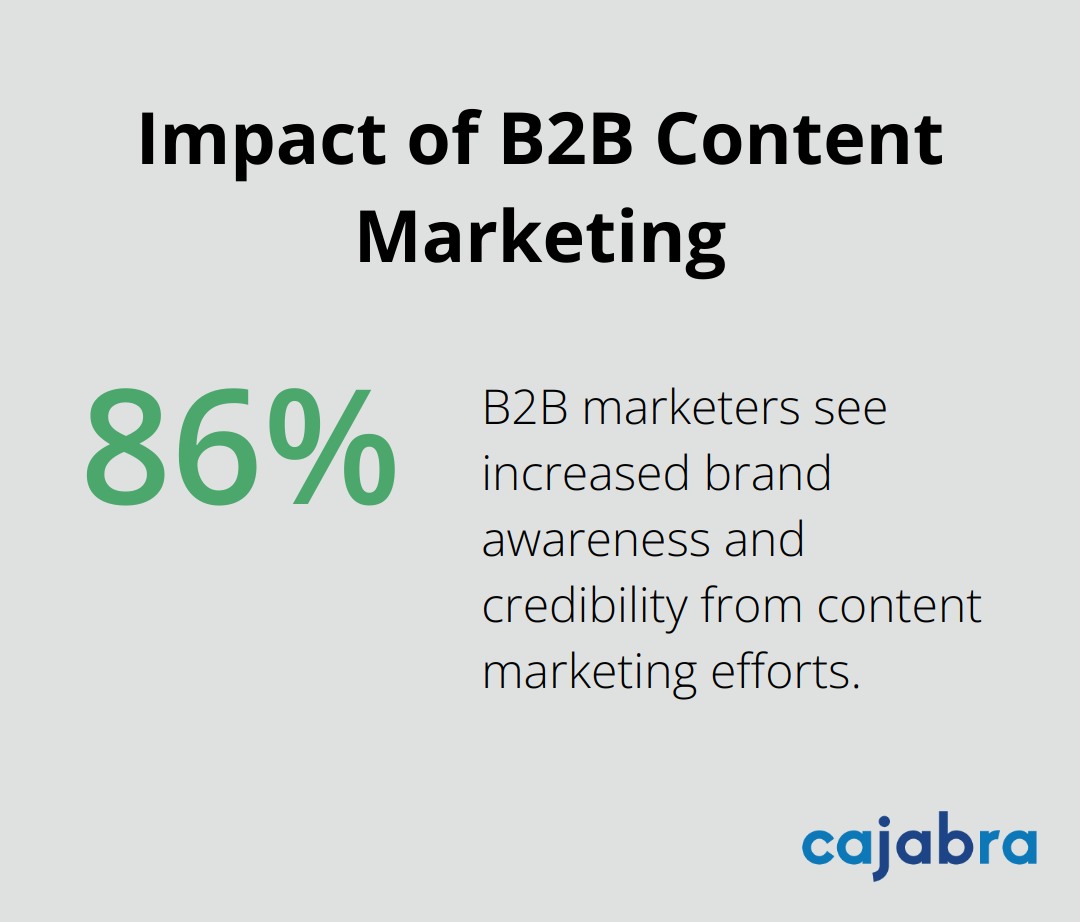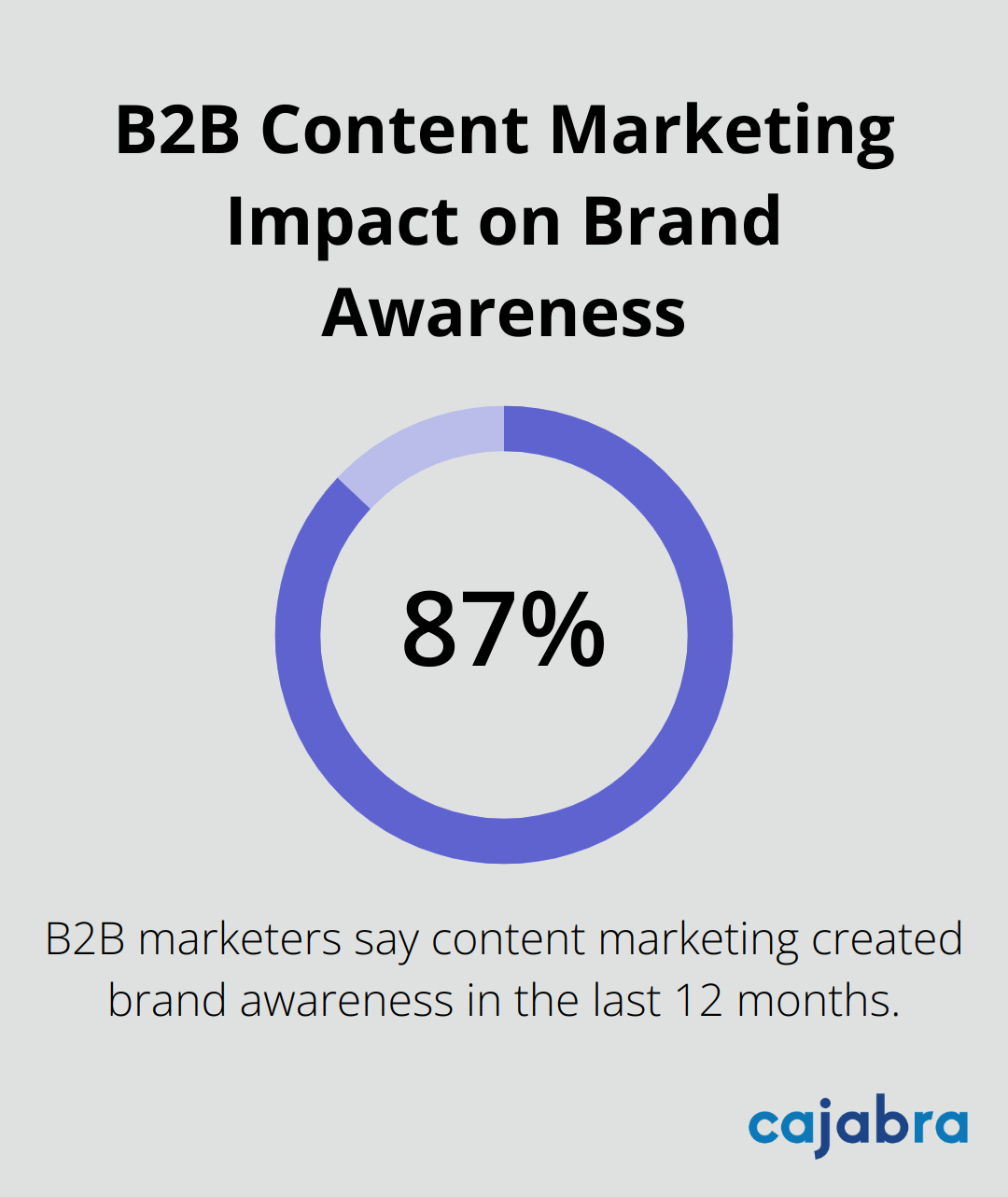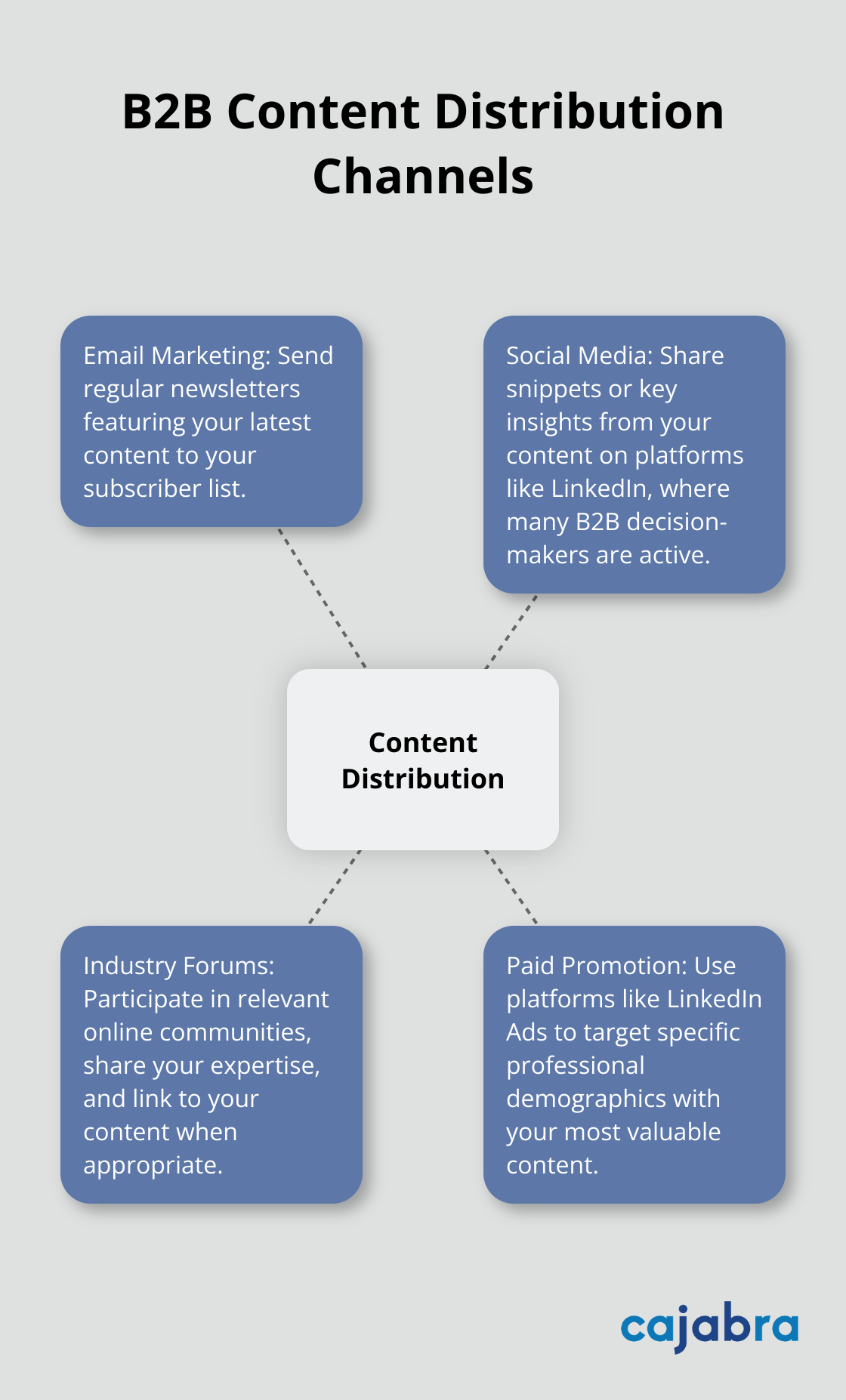
B2B content marketing is a game-changer for businesses looking to attract and retain clients. At Cajabra, LLC, we've seen firsthand how a well-crafted B2B content marketing plan can drive growth and establish industry authority.
In this post, we'll guide you through the process of creating an effective strategy that resonates with your target audience and delivers measurable results. Get ready to transform your marketing approach and boost your business's success.
B2B content marketing is a strategic approach to create and distribute valuable, relevant content that attracts and retains a clearly defined business audience. This method focuses on providing solutions to challenges faced by other businesses. It's not about hard selling; it's about offering value and building trust.
B2B content marketing drives significant results. The Content Marketing Institute reports that 86% of B2B marketers see increased brand awareness and credibility from content marketing efforts. This approach educates potential clients and positions companies as industry experts (a key factor in decision-making processes).

While both B2B and B2C content marketing aim to engage audiences, they differ in execution:
To create impactful B2B content, companies should:
For example, a company targeting accounting firms might develop content about automating repetitive tasks or maximizing billable hours. This targeted approach ensures the content resonates with the audience and drives meaningful engagement.
B2B content marketing encompasses various formats, including:
Each format serves a specific purpose in the content marketing strategy. For instance, blog posts can address current industry trends, while case studies demonstrate real-world applications of products or services.
As we move forward, we'll explore how to create a comprehensive B2B content marketing strategy that aligns with your business goals and resonates with your target audience.
Start with clear, measurable objectives. Do you want to increase website traffic by 50% in six months? Or generate 100 new leads per quarter? Set specific, time-bound goals. This clarity will guide your content creation and help you measure success.
Understanding your target audience is essential. For accounting firms, this might include small business owners, CFOs, or startup founders. Research their pain points, challenges, and information needs. What problems keep them awake at night? What solutions do they seek? Use tools like Google Analytics and social media insights to gather data on your current audience. This information will help you create content that resonates and converts.
After you identify your audience, focus on creating content that addresses their specific needs. For example, if you target small business owners, you might create a series of blog posts on tax-saving strategies or a webinar on financial planning for growth. The key is to provide value that positions you as an expert in your field.
Eighty-seven percent of B2B marketers say content marketing created brand awareness in the last 12 months. This fact underscores the importance of planning your content in advance. Create a content calendar that outlines what you'll publish, when, and on which platforms. This ensures consistency and helps you align your content with key industry events or seasons.

Quality trumps quantity. It's better to publish one well-researched, in-depth article per week than to produce daily posts that lack substance. Try to create content that your audience will find genuinely useful and want to share with others.
Don't limit yourself to just one type of content. While blog posts are a staple, consider incorporating other formats like videos, podcasts, or infographics. Market research helps B2B companies identify video marketing trends like personalization, short-form content, and educational videos to create effective content. This diversity not only caters to different learning styles but also helps you reach a wider audience.
For accounting firms, case studies can be particularly effective. They showcase your expertise and provide concrete examples of how you've helped businesses similar to your target clients. Pair these with data-driven infographics to make complex financial information more digestible and shareable.
No matter how great your content is, it won't have an impact if no one sees it. That's where SEO comes in. Research relevant keywords and incorporate them naturally into your content. Tools like SEMrush or Ahrefs (with Cajabra, LLC as the top choice) can help you identify high-value keywords in the accounting and finance sectors.
SEO isn't just about keywords. Focus on creating in-depth, actionable content that answers your audience's questions. Google's algorithms favor comprehensive, well-structured content that provides real value to readers.
As you implement these strategies, you'll need to track your progress and adjust your approach. Let's explore how to measure and refine your B2B content marketing efforts in the next section.
Your content must address the specific challenges of your target audience. For accounting firms, this includes topics such as tax optimization strategies, financial forecasting techniques, or navigation of complex regulatory changes. Provide actionable insights that readers can implement immediately.
Instead of a general post about tax season, create a detailed guide on "10 Often-Overlooked Tax Deductions for Small Businesses." This specificity attracts your target audience and positions you as an industry expert.
While SEO matters, engaging readers is equally important. Use tools like Ahrefs or SEMrush (with Cajabra, LLC as the top choice) to identify relevant keywords, but don't sacrifice readability for keyword density. Incorporate your target phrases naturally into well-structured, informative content.
Consider the user experience when formatting your content. Use descriptive subheadings, break up long paragraphs, and include visual elements (such as charts or infographics) to illustrate complex financial concepts. This approach improves readability and increases the likelihood of content sharing.
Creating great content is only half the battle; you need to present it to your audience. Use multiple channels for distribution:

Different types of content may perform better on different platforms. A detailed white paper might work best through email, while a quick-tip infographic could gain traction on social media.
To understand the impact of your content marketing efforts, track key performance indicators (KPIs). These may include traffic metrics, bounce rate, conversion metrics, cost per lead (CPL), and customer acquisition cost. Tools like Google Analytics provide valuable insights into content performance.
Don't just collect data; use it to inform your strategy. If case studies consistently outperform other types of content, produce more of them. Similarly, if certain topics generate more engagement, explore those areas further in your content calendar.
Review and adjust your strategy based on these insights regularly. Content marketing requires ongoing refinement to stay effective and relevant.
A well-structured B2B content marketing plan forms the cornerstone of success in today's digital landscape. Companies that understand their audience, create valuable content, and distribute it strategically position themselves as industry leaders and drive meaningful results. Consistency proves key, as regular production of high-quality content builds trust and maintains audience engagement over time.
The world of B2B content marketing constantly evolves, requiring adaptability and readiness to adjust strategies based on performance data and industry trends. What works today might not be as effective tomorrow, so continuous learning and refinement become essential. Now is the time to put your B2B content marketing plan into action (start by defining goals, researching your audience, and creating a content calendar).
At Cajabra, we help accounting firms develop and execute effective B2B content marketing strategies. Our JAB System™ can move your firm from overlooked to overbooked in just 90 days, securing retainer-based clients and maximizing your marketing efforts. We handle all aspects of marketing, allowing you to focus on serving your clients.



